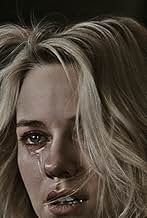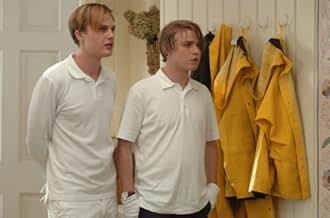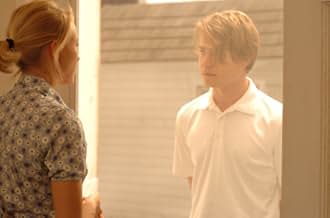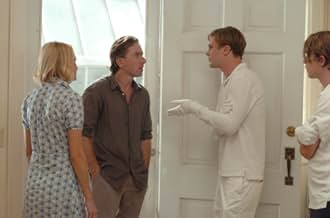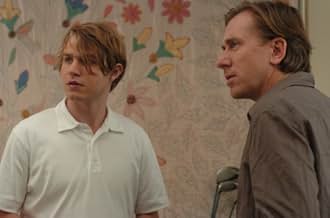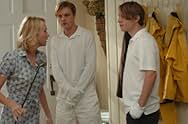Two psychopathic young men take a family hostage in their cabin.Two psychopathic young men take a family hostage in their cabin.Two psychopathic young men take a family hostage in their cabin.
- Awards
- 1 win & 6 nominations total
- Director
- Writer
- All cast & crew
- Production, box office & more at IMDbPro
Featured reviews
An unusual film that borders on art house horror. Experience almost 2 hours of an innocent family being tortured by 2 psychopaths. Much of the violence is off camera but the associated drama is still disturbing. Without dropping spoilers, the video rewind scene and the film ending might infuriate some vanilla cinema goers but a certain audience will celebrate this unique German horror drama.
My rating 7/10
I saw this at the London Film Festival and found it to be exactly what I expected: an English-language facsimile by Michael Haneke of his 1997 German film of the same title. Not that this is a bad thing. It is a testament to Haneke's artistic ability to replicate perfectly his previous film shot-by-shot with equal effect, tension, and intrigue even as one knows what to expect--although it might also say something about Haneke's ego that he doesn't feel that he needed to change or add new material for audiences who've already seen the original. The performances are overall well-executed, especially by Naomi Watts, an actress who has proved that she will still take risks despite the fact that she has made it both in the art-house scene and in mainstream Hollywood.
Haneke wanted to replicate the original film for American audiences since he has considered the story closer culturally to American society. That is a noble effort, but I am not sure if it required him to remake an exact replica of one of his earlier works, nor am I sure that it will have quite the impact he wants since the American audiences he is targeting might avoid it all together (as it might be seen as too art-house or extreme) or be completely turned off by its content and artistic approach. Nonetheless, it is interesting to witness as an exercise in a film artist revisiting his earlier work, even if he didn't bother changing anything.
Haneke wanted to replicate the original film for American audiences since he has considered the story closer culturally to American society. That is a noble effort, but I am not sure if it required him to remake an exact replica of one of his earlier works, nor am I sure that it will have quite the impact he wants since the American audiences he is targeting might avoid it all together (as it might be seen as too art-house or extreme) or be completely turned off by its content and artistic approach. Nonetheless, it is interesting to witness as an exercise in a film artist revisiting his earlier work, even if he didn't bother changing anything.
This is probably due to the fact that I just watched the original yesterday but it was almost distracting how similar this was. Like the 1997 version, this movie felt very authentic but to me it didn't leave the same impact.
I definitely prefer Arno Frisch as Paul. Not that this version is significantly worse or anything, he just doesn't stick out to me as much as he did in the original.
All in all, my only take away from this is that it's an english remake of Funny Games. If that's all it was trying to do, i'd say it did it well. Might have to rewatch this when the original film isn't as fresh in my head.
I laughed out loud when Fred's mom showed up.
I definitely prefer Arno Frisch as Paul. Not that this version is significantly worse or anything, he just doesn't stick out to me as much as he did in the original.
All in all, my only take away from this is that it's an english remake of Funny Games. If that's all it was trying to do, i'd say it did it well. Might have to rewatch this when the original film isn't as fresh in my head.
I laughed out loud when Fred's mom showed up.
The premise is not a thousand miles away from William Wyler's "Desperate Hours" but the distances here are measured in a different way. Michael Heneke the "author" of this horror thriller of sorts is at the service of his vision of himself. He's not the first "author" to suffer from the same malady but here it's so bloody obvious that becomes kind of funny. From the opening credits you know that "pretension" will permeate the whole movie and it does but, the funny thing is that it's riveting. I watched the whole nonsense with my mouth open. That's an achievement, isn't it? I haven't seen the original German version (a blow by blow account directed by Heneke himself)but, I must confess, I think I will, I think I want to. Don't ask me why. This is as empty as anything I've ever seen. A public act of obscenity and yet you can't, you just can't look away. Naomi Watts is terrific as the smart middle class wife and mother that will notice for first that Michael Pitt is not that good an actor. She sees through him - who wouldn't? - pretty much from the start. Michael Pitt plays the creep as a creep with good manners. So on the nose that doesn't manage to be frightening. He is shocking because of what he does but not for what he appears to be. He has no sexual presence. Tim Roth, as the weakling husband is disturbingly convincing and the young actor playing their son is truly wonderful. So here I am, talking about a film I kind of detested with unexpected respect. Michael Heneke may be one of those artists who are extraordinary self promoters, but he's an artist none the less and like real artist often do, divide, confront and provoke. So, did I like "Funny Games"? No. Will I see it again? Absolutely.
When I heard Michael Haneke was re-making Funny Games in America I wondered why: what purpose could it possibly serve? The set-up to both versions is simple in that a bourgeois family is subjected to a torturous ordeal by a couple of ever so polite psychopaths. Moreover, like the original the re-make is a cruel exercise in exposing our fascination with the violence depicted in the media - the "our" specifically meaning the middle classes, comfortable in our existences and oblivious to the horrors of the world.
However, Haneke is on record as saying that he always considered Funny Games to be an "American story", as he regarded the use of violence as a form of entertainment to be a specifically American phenomenon. No matter that this is a bit of a flawed viewpoint: having the aggressors seem straight out of the O.C. gives the impact of their sadistic actions an even more discomfiting air. Michael Pitt (charismatic and barbarous) and Brady Corbett (seemingly dopey but utterly vicious) are both excellent, but their performances leave one feeling a bit um "seen it all before".
Which takes me back to my first thought: what is the point? Cosmetics aside this is exactly the same film, right down to the assumption that the well to do like to listen to classical music and that the audience may be unsettled by playing them some thrash metal. Haneke even has Pitt address the camera and manipulate the film, so re-using the trick about playing with reality and focusing the viewer on what actually counts as real. It is just that this playing around does not carry the impact it did 10 years ago.
In fact, due to the unconventional nature of the film and the vast disparity it offers with reality it's hard to care much at all. Yes what happens is horrible, but it does not feel at all real. I'm waiting for someone to point out that, that is Haneke's point, but frankly, I don't care. No amount of intellectualising can make this watchable.
You would think Haneke would know better too. His most recent film Hidden took a genre film and flipped it about to deliver one of the most surprising and intellectually challenging thrillers of the decade. By stringing the audience along and offering some sense of catharsis and understanding of character motivation he offered a way in. Funny Games U.S. offers no such intrigue or tension and is ultimately a big step backward. He may see it as an American story, but it worked better as a small Austrian film, set in anywheres-ville Europe.
However, Haneke is on record as saying that he always considered Funny Games to be an "American story", as he regarded the use of violence as a form of entertainment to be a specifically American phenomenon. No matter that this is a bit of a flawed viewpoint: having the aggressors seem straight out of the O.C. gives the impact of their sadistic actions an even more discomfiting air. Michael Pitt (charismatic and barbarous) and Brady Corbett (seemingly dopey but utterly vicious) are both excellent, but their performances leave one feeling a bit um "seen it all before".
Which takes me back to my first thought: what is the point? Cosmetics aside this is exactly the same film, right down to the assumption that the well to do like to listen to classical music and that the audience may be unsettled by playing them some thrash metal. Haneke even has Pitt address the camera and manipulate the film, so re-using the trick about playing with reality and focusing the viewer on what actually counts as real. It is just that this playing around does not carry the impact it did 10 years ago.
In fact, due to the unconventional nature of the film and the vast disparity it offers with reality it's hard to care much at all. Yes what happens is horrible, but it does not feel at all real. I'm waiting for someone to point out that, that is Haneke's point, but frankly, I don't care. No amount of intellectualising can make this watchable.
You would think Haneke would know better too. His most recent film Hidden took a genre film and flipped it about to deliver one of the most surprising and intellectually challenging thrillers of the decade. By stringing the audience along and offering some sense of catharsis and understanding of character motivation he offered a way in. Funny Games U.S. offers no such intrigue or tension and is ultimately a big step backward. He may see it as an American story, but it worked better as a small Austrian film, set in anywheres-ville Europe.
Did you know
- TriviaTim Roth has said making this film traumatized him, and he'll never watch it. He said he was particularly disturbed because Devon Gearhart resembled his own son.
- GoofsWhen Ann is talking to her friend on the phone she mentions that the kitchen clock is broken and it needs fixed. The clock is clearly visible on the shelf to her right. When Peter/Tom comes back into the kitchen for eggs, the clock is missing.
- SoundtracksCare Selve, Ombre Beate
from 'Atalanta'
Written by George Frideric Handel (as G. F. Händel)
Performed by Beniamino Gigli
(P) 1950 EMI Records, Ltd.
Digital Remastering: (P) 1999 EMI Records
Courtesy of EMI Music (France)
Details
- Release date
- Countries of origin
- Language
- Also known as
- Juegos sádicos
- Filming locations
- Production companies
- See more company credits at IMDbPro
Box office
- Budget
- $15,000,000 (estimated)
- Gross US & Canada
- $1,294,919
- Opening weekend US & Canada
- $544,833
- Mar 16, 2008
- Gross worldwide
- $7,948,284
- Runtime
- 1h 51m(111 min)
- Color
- Sound mix
- Aspect ratio
- 1.85 : 1
Contribute to this page
Suggest an edit or add missing content







